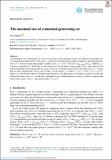Files in this item
The maximal size of a minimal generating set
Item metadata
| dc.contributor.author | Harper, Scott | |
| dc.date.accessioned | 2023-08-11T10:30:09Z | |
| dc.date.available | 2023-08-11T10:30:09Z | |
| dc.date.issued | 2023-08-10 | |
| dc.identifier | 290781723 | |
| dc.identifier | afbbaf01-9bb6-4cb0-b7b0-3b12656dab6a | |
| dc.identifier | 85169330161 | |
| dc.identifier.citation | Harper , S 2023 , ' The maximal size of a minimal generating set ' , Forum of Mathematics, Sigma , vol. 11 , e70 . https://doi.org/10.1017/fms.2023.71 | en |
| dc.identifier.issn | 2050-5094 | |
| dc.identifier.other | ORCID: /0000-0002-0056-2914/work/140362170 | |
| dc.identifier.uri | https://hdl.handle.net/10023/28150 | |
| dc.description | Funding: The author is a Leverhulme Early Career Fellow, and he thanks the Leverhulme Trust for their support. | en |
| dc.description.abstract | A generating set for a finite group G is minimal if no proper subset generates G, and m(G) denotes the maximal size of a minimal generating set for G. We prove a conjecture of Lucchini, Moscatiello and Spiga by showing that there exist a,b > 0 such that any finite group G satisfies m(G)⩽a⋅δ(G)b, for δ(G)=∑p primem(Gp), where Gp is a Sylow p-subgroup of G. To do this, we first bound m(G) for all almost simple groups of Lie type (until now, no nontrivial bounds were known except for groups of rank 1 or 2). In particular, we prove that there exist a,b > 0 such that any finite simple group G of Lie type of rank r over the field Fpf satisfies r+ω(f)⩽m(G)⩽a(r+ω(f))b, where ω(f) denotes the number of distinct prime divisors of f. In the process, we confirm a conjecture of Gill and Liebeck that there exist a,b > 0 such that a minimal base for a faithful primitive action of an almost simple group of Lie type of rank r over Fpf has size at most arb+ω(f). | |
| dc.format.extent | 10 | |
| dc.format.extent | 309104 | |
| dc.language.iso | eng | |
| dc.relation.ispartof | Forum of Mathematics, Sigma | en |
| dc.subject | QA Mathematics | en |
| dc.subject | DAS | en |
| dc.subject | MCC | en |
| dc.subject.lcc | QA | en |
| dc.title | The maximal size of a minimal generating set | en |
| dc.type | Journal article | en |
| dc.contributor.sponsor | The Leverhulme Trust | en |
| dc.contributor.institution | University of St Andrews. Pure Mathematics | en |
| dc.identifier.doi | 10.1017/fms.2023.71 | |
| dc.description.status | Peer reviewed | en |
| dc.identifier.grantnumber | ECF-2022-154 | en |
This item appears in the following Collection(s)
Items in the St Andrews Research Repository are protected by copyright, with all rights reserved, unless otherwise indicated.

